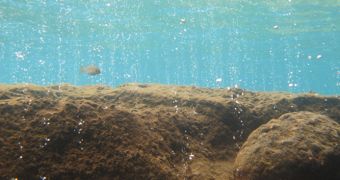A recent study of a system featuring hydrothermal vents has revealed that effects that oceanic acidification will have on ecosystems in the future. The research is critical towards understanding how global warming will change the world.
Climate scientists have been arguing for a few years that increased levels of atmospheric carbon dioxide will lead to an increase in ocean acidification, primarily through the synthesis of carbonic acid under the waves.
However, since many people appear incapable of understanding long-term changes and the complex chemistry associated with this process, researchers at the Stanford University decided to study the issue in a smaller system, such as waters near Ischia, Italy.
In this area, shallow-water volcanic vents release vast amounts of CO2 from the ocean floor, causing the water above to turn more acidic than normal. This is precisely what will happen to the global ocean if climate change is allowed to run rampant, scientists say.
“You are left with a dramatically different ecosystem that is likely going to be less able to deal with stress and is going to have less biomass available to feed organisms higher up the food chain,” Kristy Kroeker explains.
The scientist, a Stanford's Hopkins Marine Station graduate student in biology, explains that the results of this new investigation can easily be viewed as warning signals for how future climate changes will alter underwater ecosystems.
What made the team select the Italian location is the fact that the vents here do not release sulfurous compounds that characterize similar structures in the open ocean. The formations only produce CO2, and therefore make excellent proxies for the oceans of the future.
When considering the biological community as a whole, the effects of carbon dioxide emissions were very damaging to species. “The types of organisms that were winners in this acidified environment are functionally very different from those that were lost,” Kroeker explains.
Details of the new investigation appear in the latest issue of the esteemed journal Proceedings of the National Academy of Sciences (PNAS). Kroeker was the lead author of the paper, while her thesis adviser, HMS biology professor Fiorenza Micheli, was the coauthor.
“It is a simplified community and you have fewer species, so each species plays a disproportionately more important role. If something happens to one of those species, you are more likely to have larger effects in the ecosystem as a result, likely making it less stable,” Kroeker concludes.

 14 DAY TRIAL //
14 DAY TRIAL //